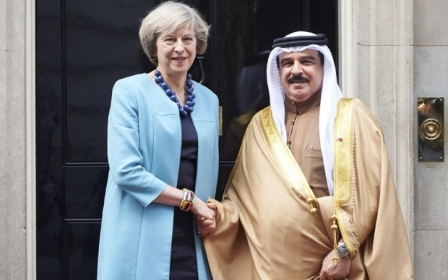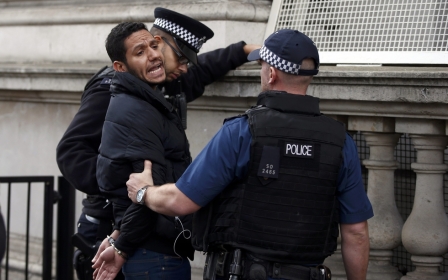UK PM in Bahrain: Britain to help Gulf 'push back' Iranian aggression

Britain will help Gulf states "push back" against aggressive regional actions by Iran, Prime Minister Theresa May told the Gulf Cooperation Council in Bahrain on Wednesday in a televised address.
"We must... continue to confront state actors whose influence fuels instability in the region," May told Gulf leaders at the summit.
"So I want to assure you that I am clear-eyed about the threat that Iran poses to the Gulf and to the wider Middle East."
She added: "We must... work together to push back against Iran's aggressive regional actions."
'I want to assure you that I am clear-eyed about the threat that Iran poses to the Gulf and to the wider Middle East'
- UK prime minister Theresa May
May said she wanted a "strategic partnership" to help boost security in Gulf countries, including defence investment and military training in Bahrain and Jordan.
The prime minister also spoke about discussions to improve trade ties with Gulf countries as Britain prepares to leave the European Union.
"I want these talks to pave the way for an ambitious trade arrangement" after Brexit, she said.
King Salman of Gulf heavyweight Saudi Arabia opened the summit on Tuesday with a call for a "doubling of efforts" to face regional challenges.
In October last year, Britain began building a naval base at Mina Salman, outside Manama, its first new permanent base in the Middle East in four decades.
Iran nuclear deal
While May highlighted the “threat” Iran poses in the Gulf, the prime minister underlined the importance of maintaining the 2015 nuclear deal, saying it makes more direct engagement with Iran on issues of concern possible.
“We secured a deal that has neutralised the possibility of Iran acquiring nuclear weapons for more than a decade,” The Guardian reported May as saying.
“It has already seen Iran remove 13,000 centrifuges, together with associated infrastructure, and eliminate its stock of 20%-enriched uranium. That was vitally important for regional security.”
US president-elect Trump has threatened to scrap the deal, signed by six major powers including Britain, in which Iran agreed to scale down its nuclear programme in exchange for sanctions relief.
Republicans opposed the deal brokered by the Obama administration and called for sanctions to be increased.
In March, Trump told supporters that his number one foreign policy objective was to “dismantle the disastrous deal with Iran”, which he called “the worst deal ever negotiated”.
May’s comments make it clear that the UK would consider itself bound by the deal even if the US withdrew.
Britain, along with the other signatories France, Germany, Russia and China, has resumed trade relations with Iran since sanctions were lifted.
Human rights 'take back seat'
Following May's landmark speech in Bahrain, human rights groups crticised the prime minister's address suggesting it showed "little real change for the UK-Gulf relationship, with human rights set to take a back seat."
In a statement published on Wednesday, the Bahrain Institute for Rights and Democracy (BIRD) said, "While economic and security ties were heavily touted, human rights went unmentioned, and only hinted at, with Mrs May stating: "We in the UK are determined to continue to be your partner of choice as you embed international norms and see through the reforms which are so essential for all of your people."
Speaking in Manama, May told Gulf leaders: "I want to leave no-one in any doubt about the scale of my ambition or the extent of my determination to establish the strongest possible trading relationships between the UK and the Gulf."
She continued: "And this is only possible because the strength of the relationship between our countries, and the respect that we have for each other, enables us to speak frankly and honestly as friends."
Downing Street issued a statement on Sunday, in which the Prime Minister made brief remarks to human rights.
But subsequent government press releases did not repeat the human rights language, highlighted BIRD.
Middle East Eye propose une couverture et une analyse indépendantes et incomparables du Moyen-Orient, de l’Afrique du Nord et d’autres régions du monde. Pour en savoir plus sur la reprise de ce contenu et les frais qui s’appliquent, veuillez remplir ce formulaire [en anglais]. Pour en savoir plus sur MEE, cliquez ici [en anglais].




